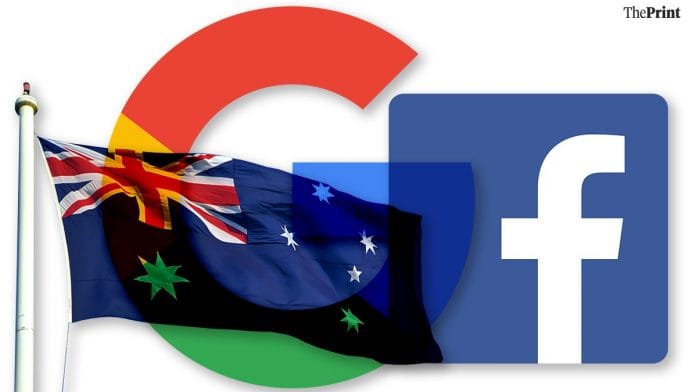New Delhi: The Australian government has been at war with Facebook and Google over its legislation that would force the tech giants to negotiate a fair payment with news publishers.
“The Australian government has said that there is an asymmetry between tech platforms and news media organisations … They have said what a lot of us in the news media are saying about the asymmetry,” observed ThePrint’s Editor-in-Chief Shekhar Gupta. He added that although we say ‘content is king’, content is actually a “pauper” today.
In episode 689 of ‘Cut the Clutter’, Gupta explained how the Australian government has shone a light on the uneven playing field between online platforms and publishers and why other countries should follow its lead.
Also read:The ‘foreign hand’ in journalism and how Australia is at the front lines
Behind the conflict
The Australian government has said there is an asymmetry in the power equation, in the market equation between big platforms and the news media — and this is responsible for the destruction of the economics of the news media.
News media is being shortchanged as a result of the shift of advertising from print and TV to digital, where everything is not transparent. For example, we don’t know how algorithms on these platforms work, Gupta stated.
He quoted Robert Thomson, the chief executive officer of News Corporation, who said, “New terms of trade are being introduced [in Australia]. But that debate extends across the globe. There is not a single serious digital regulator anywhere in the world who is not examining the opacity of algorithms, the integrity of personal data, the social value of professional journalism, and the dysfunctional digital ad market.”
The shift from print and TV to digital has spelt a lot of uncertainties for news publishers.
As per the old revenue model in print, media houses would publish a newspaper and based on the known circulation figures and the quality of readership they would sell advertising space which would then contribute to their revenue stream. “These were fair, transparent terms of trade. You know how much you’re being paid, you know how much you’re spending, what’s your profit and what’s your loss,” said Gupta.
In comparison, digital news publishers, today, have less clarity on how much revenue is coming in from advertisements. Despite the number of views or clicks, advertisements do not seem to be paying enough, Gupta said and too little comes to the media now from big platforms like Google and Facebook.
“The playing field is not level between the publishers and the platforms … Each platform has a monopoly, there is no competition, there is no negotiation,” he said.
Australia’s grievance
According to the Australian government, the digital advertising market is growing but most of the money is going to tech giants.
For instance, if $100 is being spent on digital advertising in Australia, $53 is going to Google, $28 is going to Facebook and rest to other platforms. News media organisations are given very little in return.
As per the overall figures, Google and Facebook have 80 per cent of Australia’s digital advertising market. This is a threat to the existence of news media.
“So Australia has come up with a law saying that Google and Facebook have to negotiate with every news media organisation in terms of what they will pay them for using their content,” Gupta said. The law also talks about arbitration and the arbiter will be Australian Communication and Media authority. If a publisher and a platform cannot arrive at a proper deal, the arbitrator will take a call.
Australian Prime Minister Scott Morrison asked Narendra Modi for help in its fight against the tech giants. Moreover, countries in Europe are also moving towards a model in which the platforms have to negotiate with news publishers.
“There is a global demand for regulating these platforms particularly vis-à-vis their market or business equation with news media,” Gupta said.
Also read: How Google’s deals with Murdoch’s News Corp, other media could change how world accesses news
Conflict heats up
In response to the proposed Australian legislation, Facebook blocked news to Australians while Google had said that they will stop providing their search engine in the country.
“But ultimately nobody can fight sovereign nations. Australians have given an indication of that as both Facebook and Google are now willing to negotiate,” Gupta said.
Both tech giants are said to have been in talks to formulate a deal with the government, a compromise on the key aspects of the legislation. This includes the arbitration clause, which the tech giants say will work against them.
Gupta quotes the remarks of Johan Lindberg, a professor of Media Studies at Monash University, who said, “This mandatory arbitration clause is key to the new law, without this clause the law is toothless.” Gupta said that he is in sympathy with this view —uncharacteristically, he said, “We are leaning towards intervention by sovereign governments and a regulator of sovereign governments.”
He said the platforms had become like sovereign super powers. “You need someone to level the market, which is what the Australians have tried to do,” concluded Gupta.
Watch full episode here:






